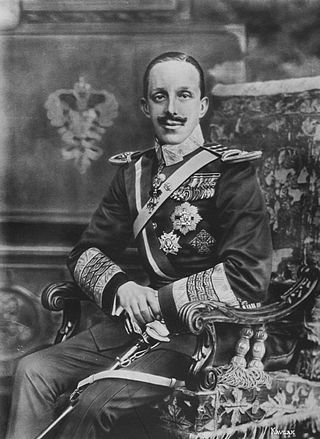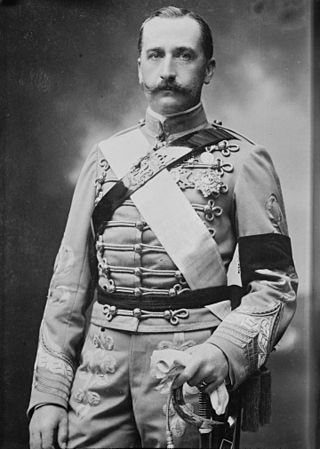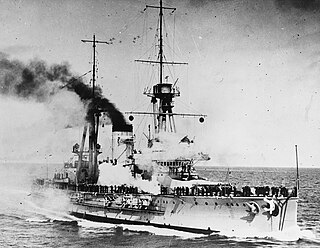Contents
This article needs additional citations for verification .(February 2024) |
| |||||
| Decades: | |||||
|---|---|---|---|---|---|
| See also: | Other events of 1901 List of years in Spain | ||||
Events in the year 1901 in Spain .
This article needs additional citations for verification .(February 2024) |
| |||||
| Decades: | |||||
|---|---|---|---|---|---|
| See also: | Other events of 1901 List of years in Spain | ||||
Events in the year 1901 in Spain .

Alfonso XII, also known as El Pacificador, was King of Spain from 29 December 1874 to his death in 1885.

Alfonso XIII, also known as El Africano or the African for his Africanist views, was King of Spain from his birth until 14 April 1931, when the Second Spanish Republic was proclaimed. He became a monarch at birth as his father, Alfonso XII, had died the previous year. Alfonso's mother, Maria Christina of Austria, served as regent until he assumed full powers on his sixteenth birthday in 1902.

Maria Christina Henriette Desideria Felicitas Raineria of Austria was Queen of Spain as the second wife of Alfonso XII. She was queen regent during the vacancy of the throne between her husband's death in November 1885 and the birth of their son Alfonso XIII in May 1886, and subsequently also until the latter's coming of age in May 1902.

Victoria Eugenie Julia Ena of Battenberg was Queen of Spain as the wife of King Alfonso XIII from their marriage on 31 May 1906 until 14 April 1931, when the Spanish Second Republic was proclaimed. A Hessian princess by birth, she was a member of the Battenberg family, a morganatic branch of the House of Hesse-Darmstadt. She was the youngest granddaughter of Queen Victoria and Prince Albert. Unlike other members of the Battenberg family, who were accorded the lower rank of Serene Highness, Victoria Eugenie was born with the rank of Highness due to a Royal Warrant issued in 1886 by Queen Victoria.

Alfonso, Duke of Anjou, Duke of Cádiz, Grandee of Spain was a grandson of King Alfonso XIII of Spain, a potential heir to the throne in the event of the restoration of the Spanish monarchy, and the Legitimist claimant to the throne of France.

Niceto Alcalá-Zamora y Torres was a Spanish lawyer and politician who served, briefly, as the first prime minister of the Second Spanish Republic, and then—from 1931 to 1936—as its president.

María de las Mercedes, Princess of Asturias was the eldest child of King Alfonso XII of Spain and his second wife, Maria Christina of Austria. She was Princess of Asturias, the heiress presumptive to the Crown of Spain, for all 24 years of her life.

Infante Jaime of Spain, Duke of Segovia was the second son of Alfonso XIII, King of Spain and his wife Princess Victoria Eugenie of Battenberg. He was born in the Royal Palace of La Granja de San Ildefonso in Province of Segovia, and was consequently granted the non-substantive title of "Duke of Segovia". Upon his father's death in 1941, Jaime inherited the Legitimist claim to the French throne and thereafter used the courtesy title "Duke of Anjou".

The Royal Spanish Football Federation is the governing body of football in Spain. Founded on 29 September 1913, it is based in La Ciudad del Fútbol of Las Rozas, a municipality near Madrid.

Infanta Eulalia, Duchess of Galliera, was the youngest and last surviving child of Queen Isabella II of Spain and King Francisco, and the youngest sister of King Alfonso XII. She authored memoirs that were controversial for their critical perspective and allegations about the political policies of various Spanish and foreign governments.

Infante Alfonso of Spain, Prince of the Two Sicilies, Duke of Calabria was one of two claimants to the title of the head of the House of Bourbon-Two Sicilies from 1960 until his death in 1964. Alfonso was the son of Prince Carlos of Bourbon-Two Sicilies (1870–1949) and his wife, María de las Mercedes, Princess of Asturias (1880–1904). He was born and died in Madrid, Spain.

Infanta Beatriz of Spain, Princess of Civitella-Cesi was a daughter of King Alfonso XIII of Spain and Victoria Eugenie of Battenberg, wife of Alessandro Torlonia, 5th Prince di Civitella-Cesi. She was a paternal aunt of King Juan Carlos I.

Don Carlos, Prince of Bourbon-Two Sicilies, Infante of Spain was the son of Prince Alfonso of the Two Sicilies, Count of Caserta and his wife Princess Maria Antonietta of Bourbon-Two Sicilies, and nephew of the last King of the Two Sicilies, Francis II.

Alfonso de Orleans y Borbón, Infante of Spain, Duke of Galliera, was a Spanish prince, military aviator and first cousin of Alfonso XIII of Spain.

Alfonso XIII was the second of three España-class dreadnought battleships built in the 1910s for the Spanish Navy. Named after King Alfonso XIII of Spain, the ship was not completed until 1915 owing to a shortage of materials that resulted from the start of World War I the previous year. The España class was ordered as part of a naval construction program to rebuild the fleet after the losses of the Spanish–American War; the program began in the context of closer Spanish relations with Britain and France. The ships were armed with a main battery of eight 305 mm (12 in) guns and were intended to support the French Navy in the event of a major European war.

Blanca de Borbón was the eldest child of Carlos de Borbón y Austria-Este, Carlist claimant to the throne of Spain and his wife Princess Margherita of Bourbon-Parma. Blanca was a member of the House of Bourbon and - according to the Carlists - an Infanta of Spain by birth. In 1889 she married Archduke Leopold Salvator of Austria, Prince of Tuscany. The couple had ten children. The family left Austria after the end of the Monarchy and finally settled in Barcelona. When the male line of Blanca's family died out at the death of her uncle, Alfonso Carlos, Duke of San Jaime, some of the Carlists recognized her as the legitimate heiress to the Spanish throne.
Princess Urraca of Bourbon-Two Sicilies was a member of the House of Bourbon-Two Sicilies and a Princess of Bourbon-Two Sicilies.

Francisco de Paula de Borbón y Castellví was a Spanish nobleman and military officer. He was a younger son of the controversial Infante Enrique of Spain, who was a grandson of Charles IV of Spain and younger brother of Francis, Duke of Cádiz, king consort of Isabella II of Spain. Despite his family ties, Francisco never had the title of Infante of Spain because his parents' marriage was unequal and did not receive approval from Queen Isabella II. That is also the reason why he was not recognised as a Carlist pretender.

Hernando Carlos María Teresa Fitz-James Stuart y Falcó, 18th Duke of Peñaranda de Duero, GE, was a Spanish nobleman.
The 233 Spanish Martyrs, also referred to as The Martyrs of Valencia or Jose Aparico Sanz and 232 Companions, were a group of martyrs from the Spanish Civil War, who were beatified in March 2001 by Pope John Paul II. This was the largest number of persons beatified at once up to that time. They originated from all parts of Spain but mostly served and died in the diocese of Valencia.